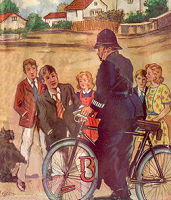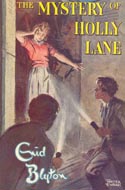
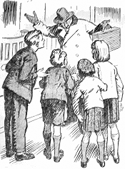
"I look for my sistair's house," said the Frenchman. "It is called Grintriss."
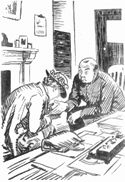
Mr Goon couldn't resist having his palm read by the funny old foreign woman.
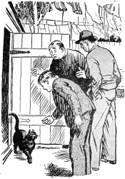
Instead of Buster rushing out, Mr Goon's own black cat strolled out haughtily.
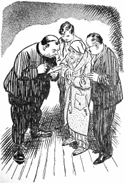
Mr Goon explains to the old man that he can't stay in a house with no furniture!
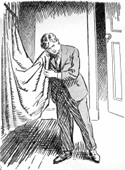
Fatty touches and feels the curtains. There's something funny about them.
The Mystery of Holly Lane
Review by Keith Robinson (February 7, 2005)
Unlike some of my old favorites, I hardly remembered this one at all. It's pretty good; not the best by any means, nor the worst. It has a solid pace, some well-drawn scenes, and one particularly memorable part where Buster is wrongly accused of chasing sheep and Mr Goon is quite prepared to have him shot (more on that in a moment). The only thing that lags a little is the ingenuity behind the mystery. It's all set up nicely, and has the makings of a great mystery. It's one of those that reads well on the back cover: Money has been stolen from a bungalow called Hollies, and now all the furniture has gone too! Oooh, mysterious! But unfortunately this mystery lacks surprise. When Fatty makes a discovery that "solves the mystery," you feel like shrugging and saying, "Is that it? I think we'd all guessed something like that by now."
To recap, Fatty sets his Find-Outer friends a few tasks to keep their brains oiled. He sends Pip off to shadow Mr Goon, and he gives Larry the strange task of pretending he's a window cleaner. While Larry's "on the job" at a bungalow in Holly Lane, he looks through a window and sees a blind old man crawling about on the floor feeling the underside of his chairs, mumbling something. Larry accidentally leaves his leather behind and heads off to report to the others. A couple of days later, when Larry's mother starts wondering where the leather is, they all go back to find it—and are startled to find the old man shouting for the police. The Find-Outers are first on the scene, and they discover that the old man's money has been stolen! It transpires he kept it in the house, in a secret place, but now it's gone. The Find-Outers get the information they need and then call Mr Goon.
After things have settled down a little, Fatty decides to return to the house to find that dratted leather. It's late at night when Fatty finally heads down to Holly Lane again, and while he's there—fumbling about in the dark late at night—he hears noises and sees torches bobbing up and down. Puzzled, Fatty watches from behind the bushes...but he can't make out what's going on, except that there are two people whispering to each other and carrying something. Next morning Fatty finds out the truth: the old man's furniture has been stolen!
This aspect of the plot is nice and puzzling, or would be if it wasn't established so clearly that the old man's money was most likely hidden within the furniture somewhere. Ideas are thrown back and forth: maybe the burglar didn't steal the money after all, and came back to steal the furniture because he knew it was hidden in the upholstery somewhere? But then why did the old man think it had been stolen in the first place? Maybe some of it had been stolen, and the thief had returned for the rest. Or maybe the old man just forgot where he put it. Lots of questions like these are bandied about, and a list of suspects drawn.
The suspects are crossed off the list very easily. In The Mystery of the Pantomime Cat there was a lot of emphasis placed on alibis. Fatty went to great pains to prove that a suspect was where he says he was at the time of the robbery by checking alibis. But in this mystery, the interviews seem a little half-hearted—and the "nice suspects" are automatically crossed off for no reason other than they're nice. As usual the "bad" person is the culprit, so no surprise there. Strangely, when the thief is finally apprehended, no mention whatsoever is made of the accomplice. Maybe it's not important.
There's a really interesting section where Mr Goon pays a boy to steal Buster and lock him Mr Goon's shed, and pretend that he caught the dog chasing sheep. This is despicable behavior for a policeman (or anyone) and Goon rightly gets what he deserves when he brings Fatty's father down to the police station to "show him the dog they caught." Just before they arrive, Fatty cleverly rescues Buster and replaces him with Mr Goon's cat. Mr Trotteville is not impressed with the flat-footed policeman.
Enid Blyton often "talks her action"—that is, letting the kids' dialogue explain something that's happening, like "Pip, turn the coat inside out—that's right. Now see if there are any hidden pockets. There are? Good." It works for the most part, and certainly saves room! But sometimes I think Blyton forgets to pace herself. There's a scene where the Find-Outers meet up "somewhere on the way to Hollies." Larry is going to the Hollies in Holly Lane to find the leather he'd left behind. Three short lines of dialogue later they arrive, with "Look—isn't that the place, Larry—that little bungalow there?" Three short lines of dialogue can't be more than twenty paces, which means they were there already. ;-)
Ooh, I have to mention Larry's whining! He thinks Fatty's idea of "being a window cleaner for a day" is rather silly, and he says so. But he does it anyway, and forgets his leather. Then his mother starts looking for it, and Larry complains again that it really was a silly idea of Fatty's, this window-cleaning lark. Fatty offers to go find it, but can't, and trouble brews. Larry complains again. Then Mr Goon produces the leather, which is a "vital clue" to the robbery. "Well, we're in an awful fix now," said Larry, "and really I can't help saying again, Fatty, that it was a most idiotic idea of yours to tell me to go and clean windows." All right, all right, Larry! Shut up! Poor Fatty takes it on the chin like a man each time, but it was Larry's own stupid fault he left it behind in the first place! If I were Fatty I'd be saying, "Look, pal—nobody twisted your arm to clean the windows, and it wasn't me who left the leather behind. So get over it."
Enid Blyton makes a gaff in this one. Towards the end of the second-to-last chapter, Pip comments on how he's going to get into awful trouble for being out so late. Larry agrees and says, "You're lucky, Fatty, your parents never seem to mind." Fatty replies, "I'm older than you are, and wiser." Arrghh! While Fatty certainly is a lot wiser, he is in fact a year younger. And speaking of gaffs, I got a little irritated by a plethora of punctuation errors in the latter half of this book. Maybe the copyeditors got fed up with it and just skimmed over the rest.
Overall, this is not a bad read, and in places is really excellent—but towards the end it's a bit of an anti-climax. No twists, and no particularly clever detective work. But at least Chief Inspector Jenks is now a Superintendent!


